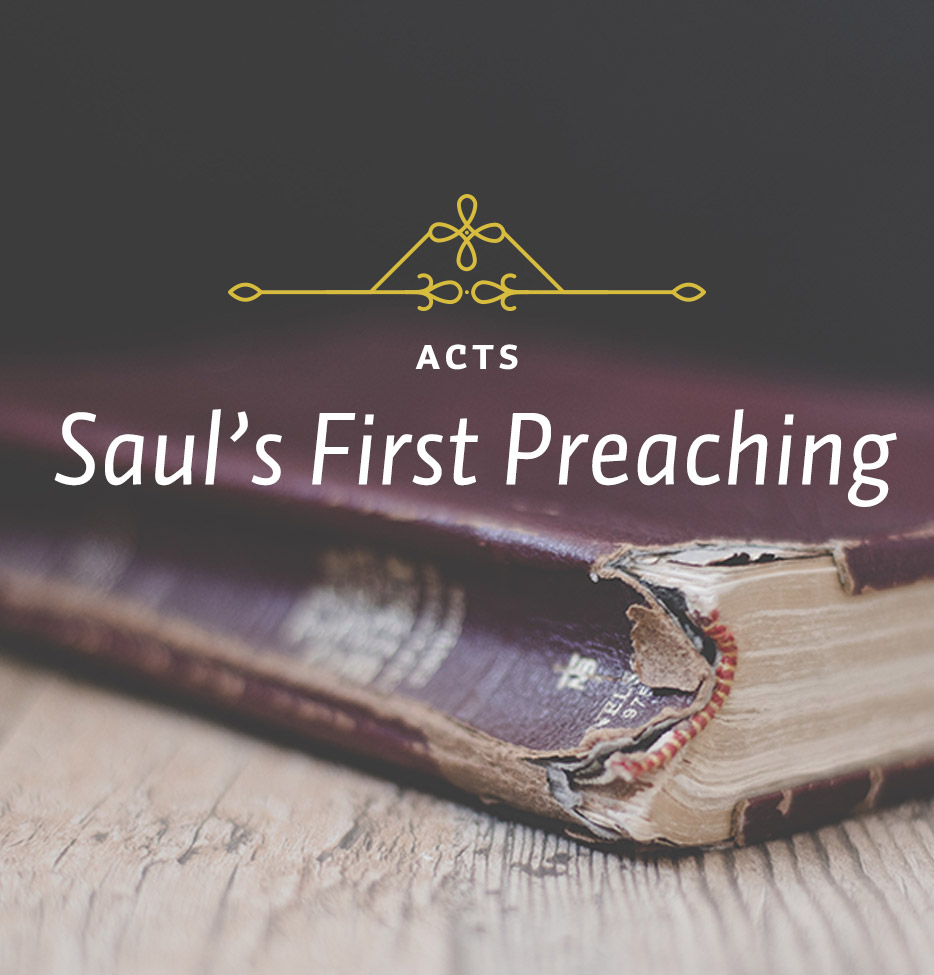There was one person who was not afraid of Paul. His name was Barnabas, which means “son of encouragement.” Barnabas has already been introduced to us as a Levite from Cyprus who sold his property and gave the proceeds to the early church (Acts 4:36-37). Later on we will see him traveling with Paul on his first missionary journey (Acts 13-14). In this chapter we see him seeking Paul out when everybody else was afraid of him, listening to him, recognizing that his testimony was genuine, and then bringing him to the apostles. He would have said to them, “You are wrong about Paul. He was on a journey to Damascus, and Jesus revealed Himself to him on the way. The man is changed.” Barnabas brought Paul to the apostles, and Paul spent the next few days in Jerusalem with others who knew the Lord.
It was not a long time. Paul tells about it in Galatians, stressing how little contact he had with the Christian leaders. He wrote, “After three years, I went up to Jerusalem to get acquainted with Peter and stayed with him fifteen days. I saw none of the other apostles—only James, the Lord’s brother” (Gal. 1:18-19).
I imagine Paul cherished this time, even though it was short. Later in his ministry, when he was on his own in hostile areas of the world, he must have thought of those days and rejoiced that God had made him one in spirit with those other apostles who were back in Jerusalem. What do you suppose he and Peter talked about during that momentous fortnight? Undoubtedly they talked about Jesus, about His teachings and miracles, above all about His death and resurrection. Peter would have instructed Paul in these things.
Eventually his enemies got after him in Jerusalem, too. He had tried to debate with the Hellenists, taking up the mantle left by Stephen, since that is what Stephen had done. Probably Paul was trying to make up for his role in Stephen’s death. But the religious leaders hated Paul even more than they had hated Stephen and tried to kill him. When the Christians learned of this, they took Paul to Caesarea and sent him to Tarsus.
John R. W. Stott notes the strange irony of this situation. “The story of Saul’s conversion in Acts 9 begins with him leaving Jerusalem with an official mandate from the high priest to arrest fugitive Christians, and ends with him leaving Jerusalem as a fugitive Christian himself.”1
What happened then? We might suppose, since Paul was now back in Gentile territory, that he began his missionary activity at once. But as a matter of fact, he did not. Something like ten years passed before Paul finally emerged again at Antioch and was chosen by the Holy Spirit, who said, “Set apart for me Barnabas and Saul for the work to which I have called them” (Acts 13:2). At that point Barnabas and Paul became the first official missionaries of the Christian church, and Paul became a model pioneer missionary.
Paul was not at all prominent up to that point. In fact, Paul says in Galatians that he was “personally unknown to the churches of Judea” during those years (Gal. 1:22). I suppose they must have had some memory of him. They must have said, “Oh, yes, years ago there was a man who was very active in persecuting us. The rumor is that Jesus met him somewhere on the way to Damascus and that he was converted. We haven’t heard anything about him for a long time. I wonder if he is still alive.”
“Paul the unknown!” That is what he was. What a title for the most influential man in the New Testament period, if not of all Western history. Yet during these “unknown” years, God was working in his life, teaching him and training him for future service. And Paul was searching out the Scriptures to learn about the faith more thoroughly. The bottom line is that God’s ways are not our ways. His timing is not ours. We need to learn to wait on Him patiently.
We pray for people. Nothing seems to be happening. But that does not mean that nothing is happening. It only means that we cannot see it. God is working. In fact, one of the joys of getting older in the Christian life is that you begin to see some of the things God is doing. Problems we prayed about earlier are being resolved. People about whom we might have given up on early in life, we now see changed. And we are changed too. Do you ever feel that you are in a rut, that things have gone along in exactly the same way for a long time, and that nothing exciting is ever going to come into your life again? Sometimes it does seem that way. But it is only because God’s timing is not our timing. It does not mean that God will not again use us.
God is never in a hurry. His ways are always perfect. So do not give up. Keep your eyes on the Lord. Learn all you can. And while you are waiting and learning, do not forget that Jesus is still the Son of God and the Messiah. Make sure you tell that to others.
1John R. W. Stott, The Message of Acts: To the Ends of the Earth (Leicester, England; InterVarsity, 1990), 179.






